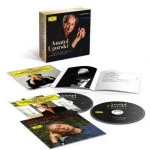
Composer: Johann Sebastian Bach, Ludwig van Beethoven, Johannes Brahms
Performer: Davide Cabassi
Format: FLAC (tracks)
Label: Endeavour Classics
Catalogue: END1025
Release: 2009
Size: 185 MB
Recovery: +3%
Scan: cover
Bach: Capriccio sopra la lontananza del suo fratello dilettissimo, BWV992
01. Arioso – Adagio
02. Andante
03. Adagissimo
04. His Friends Come
05. Aria di postiglione – Adagio poco
06. Fuga all’imitazione della cornetta di postiglione
Beethoven: Piano Sonata No. 31 in A flat major, Op. 110
07. Moderato cantabile molto espressivo
08. Allegro molto
09. Adagio, ma non troppo – Fuga
Brahms: Variations and Fugue on a Theme by Handel, Op. 24
10. Aria
11. Variation I: Piú Vivo
12. Variation II: Animato
13. Variation III: Dolce, scherzando
14. Variation IV: Risoluto
15. Variation V: Espressivo
16. Variation VI: Sempre misterioso
17. Variation VII: Deciso, con vivacita
18. Variation VIII: Deciso, con vivacita
19. Variation IX: Poco sostenuto
20. Variation X: Allegro energico
21. Variation XI: Moderato, dolce espressivo
22. Variation XII: L’istesso tempo
23. Variation XIII: Largamente, ma non troppo
24. Variation XIV: Sciolto
25. Variation XV
26. Variation XVI
27. Variation XVII: Più mosso
28. Variation XVIII
29. Variation XIX: Leggiero e vivace manon troppo
30. Variation XX: Andante
31. Variation XXI: Vivace
32. Variation XXII: Alla musette
33. Variation XXIII: Vivace
34. Variation XXIV
35. Variation XXV
36. Fuga
Italian pianist Davide Cabassi was a finalist at the 2005 Van Cliburn Competition in Fort Worth. His first recordings have been intelligently programmed. The title of this one, Escaping, might be a loose translation of the movement “in fuga” that concludes each of the three works on the program, and the concept is backed up by innovative graphic design. Annotator Joshua H. Izzard goes on to assert that each work embodies “a transcendence and triumph of substance and form over worldly worries.” That’s a rather nebulous concept, and one that could be debated for at least two of these works. Indeed, the teenaged J.S. Bach’s Capriccio in B flat major on the Departure of His Beloved Brother, BWV 992, the composer’s only fully programmatic work, would seem more quotidian than transcendent. Probably composed on the occasion of Bach’s brother’s departure for a new job, it evokes such details as friends trying to persuade him not to go. There is a humorous aspect to the music that eludes Cabassi, although he’s a fine Bach pianist. The Beethoven Piano Sonata No. 31 in A flat major, Op. 110, whose transcendence can be granted, may be the strongest of the three performances on the album. There are many versions that differentiate the four movements more than Cabassi does, for example by speeding through or playing up the bumptious humor of the Scherzo. But Cabassi’s clean approach, which makes the structure of the final fugue very clear, succeeds on its own terms. The Brahms Variations and Fugue on a Theme by Handel, Op. 24, is something like Beethoven’s Diabelli Variations, Op. 120, in its way of extracting the maximal structural and stylistic implications from a small kernel; the listener is taken on a tour of styles whose corners are not always fully illuminated here, although the slam-bang finale is effective. For his fresh thinking about programming, Cabassi is clearly a pianist to watch.



